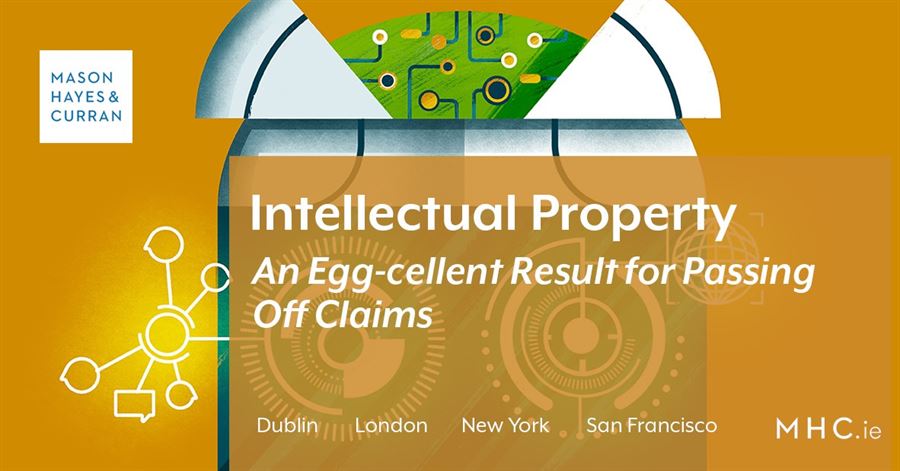
The principles of the tort of passing off were recently examined by the Court of Appeal in the Galway Free Range Eggs case[1]. The appellant, Galway Free Range Eggs, appealed the Order of the High Court dismissing its claim for an Order restraining its competitor from passing off its goods by the use of the name “O’Briens of Galway Free Range Eggs”.
The case is particularly interesting in that it confirms:
- The ability of otherwise descriptive terms to gain a secondary meaning and attract sufficient goodwill for passing off purposes, and
- The acceptance of survey evidence in passing off cases
Triple Test for passing off
The test for passing off is the well-established three part test which has been approved in this jurisdiction most notably in Jacob Fruitfield Limited v United Biscuits (UK) Limited[2]; and more recently by the Supreme Court in McCambridge Ltd v Joseph Brennan Bakeries[3].
In Jacob Fruitfield, Mr Justice Clarke paraphrased the three elements of the test:
- The existence of a reputation or goodwill in the claimant’s product including, where appropriate, in a brand name or get up
- Misrepresentation leading to confusion between what is alleged to be the offending product and the claimant’s product, and
- Whether damage to the claimant’s goodwill or reputation by virtue of any such confusion has been established
Hence the test can be distilled down to the classic trinity of goodwill; misrepresentation or confusion; and damage.
Reputation or goodwill
As regards the first element of the test, reputation or goodwill, the Court found that the trial judge had misconstrued the case before him by focusing on the “get up” of the packaging of the egg boxes as opposed to the brand name as pleaded by the appellants.
In examining whether the appellants had established goodwill in the brand name, the Court adopted the reasoning of Ms Justice Laffoy in Guinness v Kilkenny Brewing Company Limited[4] and found that it was possible for the appellant to have an established goodwill in the name “Galway” used in connection with the words “Free Range Eggs”. The Court found that there was ample evidence as to the existence of the reputation of the appellant in the brand and the appellant had clearly satisfied the first limb of the triple test.
The Court observed that although EU and domestic regulations required the respondents to label their egg cartons as “free range eggs”, this did not require that the label was included in the brand name, and ultimately did not justify its inclusion in the respondent’s brand name.
Misrepresentation or confusion
The Court held that the test to be applied was whether the use of the brand name by the respondents was likely to confuse people into perceiving a connection or association with the appellant. The trial judge had erred in failing to apply this test and it was not sufficient for the lower court to simply find the appellant had failed to establish misrepresentation leading to confusion.
The Court was critical of the trial judge’s failure to take account of survey evidence produced by the appellant. The trial judge was found to have erred in dismissing the survey evidence submitted in light of Supreme Court jurisprudence (Hanafin[5] and Jordan[6]) which upheld the admissibility of survey evidence to prove a fact in issue. In a passing off context, the Court found it was possible to use survey evidence to prove the existence of a reputation or the likelihood of confusion and the weight to be attached to such evidence was a matter for the Court. In particular, the Supreme Court had adopted authorities from other jurisdictions which held that a party should not be compelled to produce in the courtroom an indeterminable parade of witnesses to depose individually as to their knowledge and understanding of an association between brands. The Court was satisfied on the survey evidence before it that there was an agreement by experts on both sides that a significant minority of the population (in this case 29%) perceived that there was a risk of confusion and accordingly the second limb of the test was discharged.
Damage
The Court found on the basis of earlier authorities, including the Kilkenny Brewing case and O’Neill’s v Irish International Sports, that it was not necessary for the plaintiff to show that it had actually sustained damage and it was the appropriation of goodwill which constituted the damage necessary in order to obtain injunctive relief. The Court found that the appellant had succeeded in establishing this final limb. Accordingly the case for the tort of passing off was established and the Court granted the appellants an injunction restraining the respondents from trading under the name “O’Briens of Galway Free Range Eggs”.
Conclusion
The judgment provides a useful analysis of the tort of passing off and the threshold to be met in these types of infringement cases. This judgment will be welcomed by intending plaintiffs and their advisors in passing off claims as it is indicative of a broad interpretation of what will satisfy the triple test for passing off; as well as the acceptance of survey evidence in these cases.
For more information relating to the topic of passing off claims, contact a member of our Intellectual Property team.
This article was written by Gerry Kelly and Louise Mitchell. The content of this article is provided for information purposes only and does not constitute legal or other advice.




